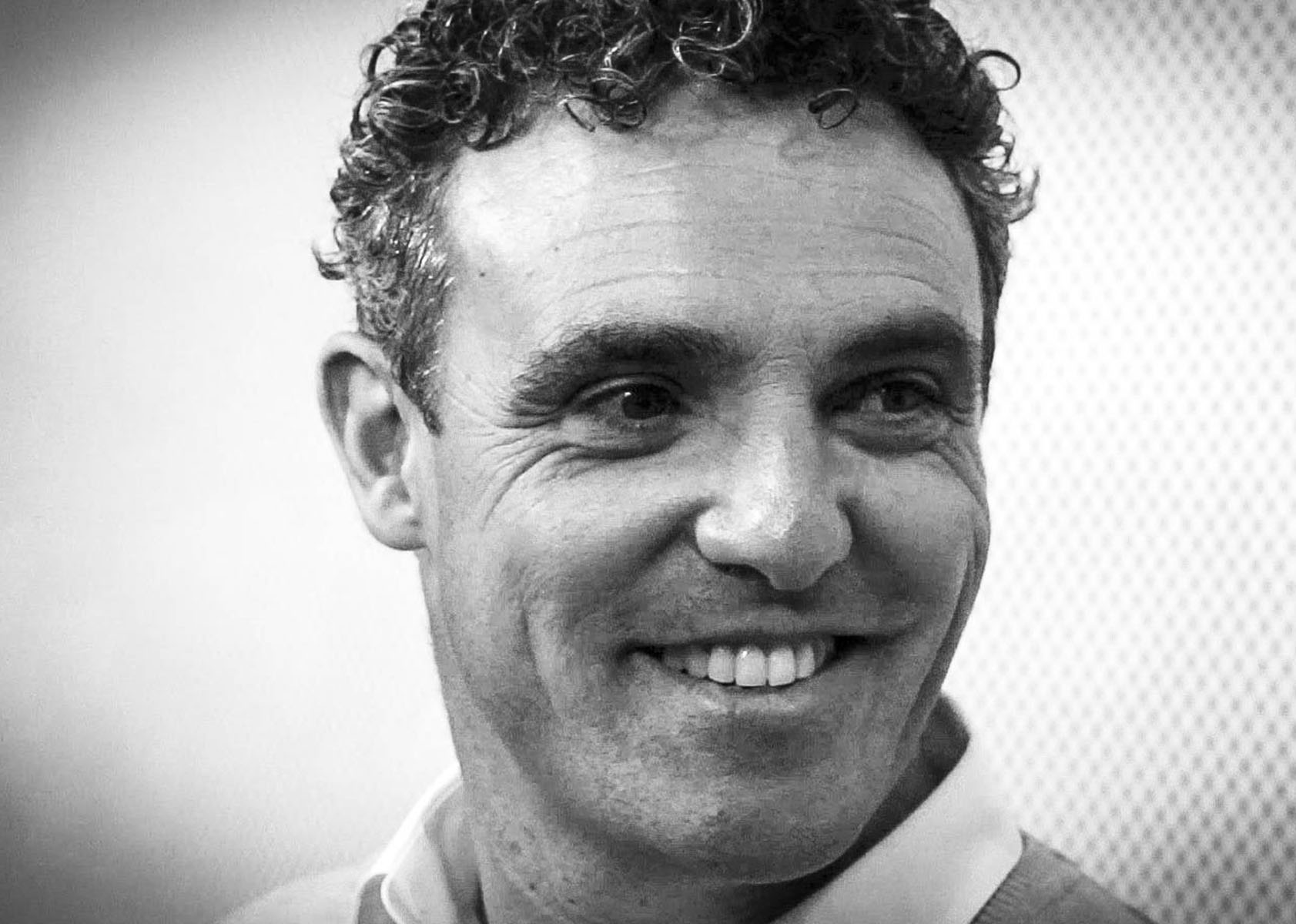
Alfredo Maestro is one of the natural wine pioneers in Spain. Self taught, he started working with wine in the late 1990s. Having grown up amongst the vines in Ribera del Duero, he began his wine education reading oenology textbooks and purchasing fruit to make wine for personal consumption. His winemaking evolved to a natural process and he is known for non-interventionist wines made without inoculated yeast and without added sulfur. His wines have an elegance and purity and a uniqueness about them. They feel connected to the land and also to the strong personality of the winemaker who willed them into existence.
Grape Collective talks with Alfredo Maestro about his journey into the natural wine rabbit hole and why he named one of his wines "The Martian."
Christopher Barnes: Alfredo, how did you get involved in the wine business? You were an economist?
Alfredo Maestro: Yes. I am an economist. I went to university in Basque country and I studied economics. The wine, my life as a winemaker was born through my passion for wine. Step by step, I began moving up and finally I could make a plan in Peñafiel. I was born in Peñafiel.
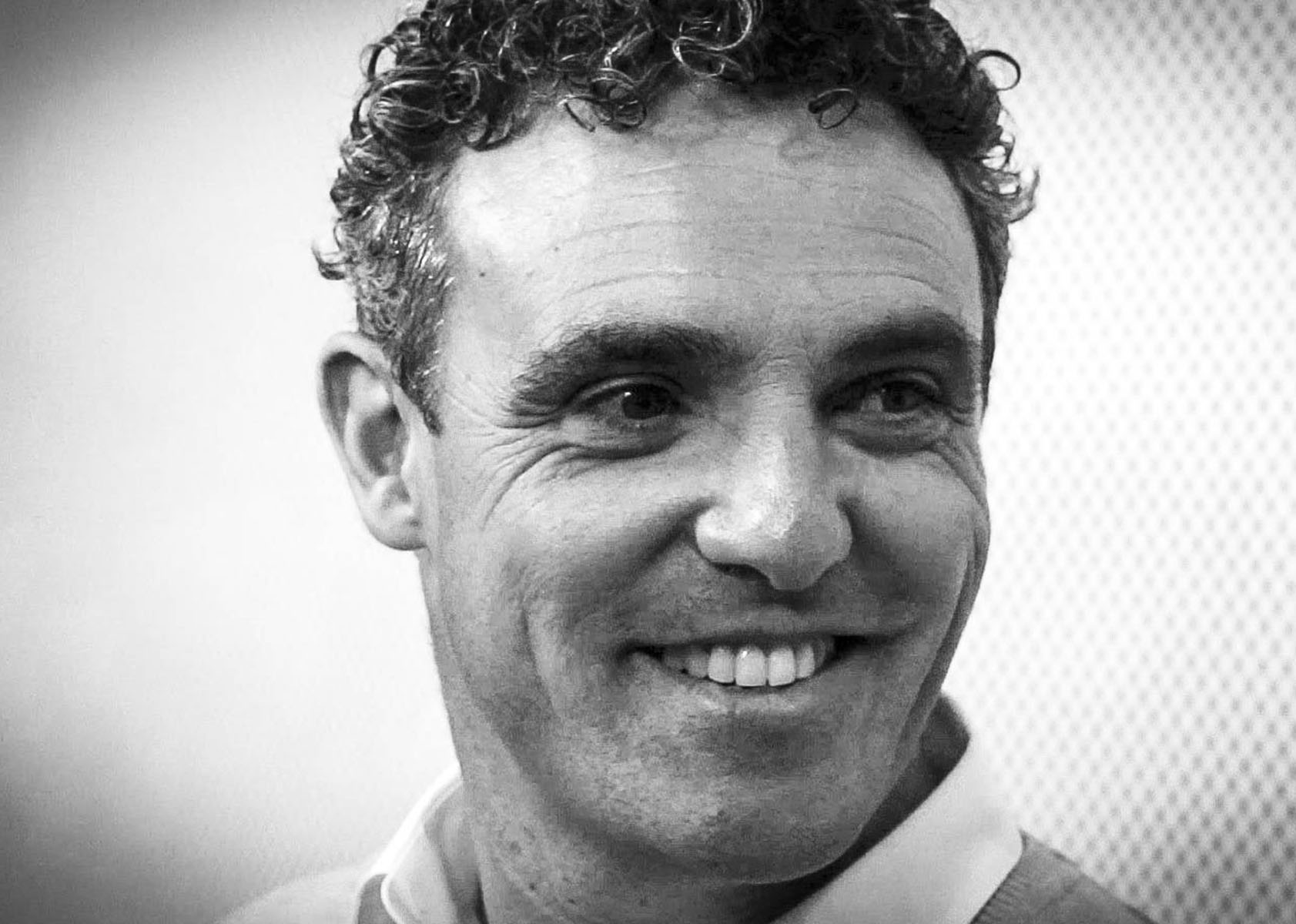 In Ribera del Duero?
In Ribera del Duero?
Yes, in Ribera del Duero. In 1998 I began to make a new plantation with an older style of Ribera del Duero, looking for the image of the wines from Ribera del Duero. But really, Ribera del Duero has shown me other things. Ribera del Duero is more than 100% Tempranillo, a new Tempranillo. And Ribera del Duero has other varieties, others within the border of the D.O. I don't go by borders because the geography is more important and the influence of the river Duero is more extensive and the soil more important (than political boundaries).
So you started in 1998. When you started, did you know that you are going to become a natural winemaker? Because your wine style is very different from what most people think of Ribera del Duero.
Yes.
Most people think about these big, muscular wines, and yours offer a lot of finesse. They are very delicious wines but they are very different from what most people think about that region.
Yes, I began studying wine auto-didactically; I studied winemaking and viticulture through books. And nowadays in this century viticulture books and winemaking don't happen without chemical products. And of course I began with these books. I began to make wine with chemical products. These wines were somewhat strong, maybe artificial. I didn't like them. My friends and family didn't like them.
In about 2000 I began to take out the chemical products and I observed the wines were more real, richer, rounder. Finally I put nothing in the wine and my friends, some clients, expressed to me that "these wines are 'other' wines." However, I didn't know a system for natural wine. I only know my history, my soul, my history as a winemaker. And I discovered I must express the soil, the plant. If the soil has some characteristics, these characteristics are important for my style of wine. If you want another style of wine, a wine that requires aging for example, you must look for other soil. This is the sensibility of the winemaker. To know his tools, the soil, the plants, the weather. The winemaker does not need chemical tools, I think.
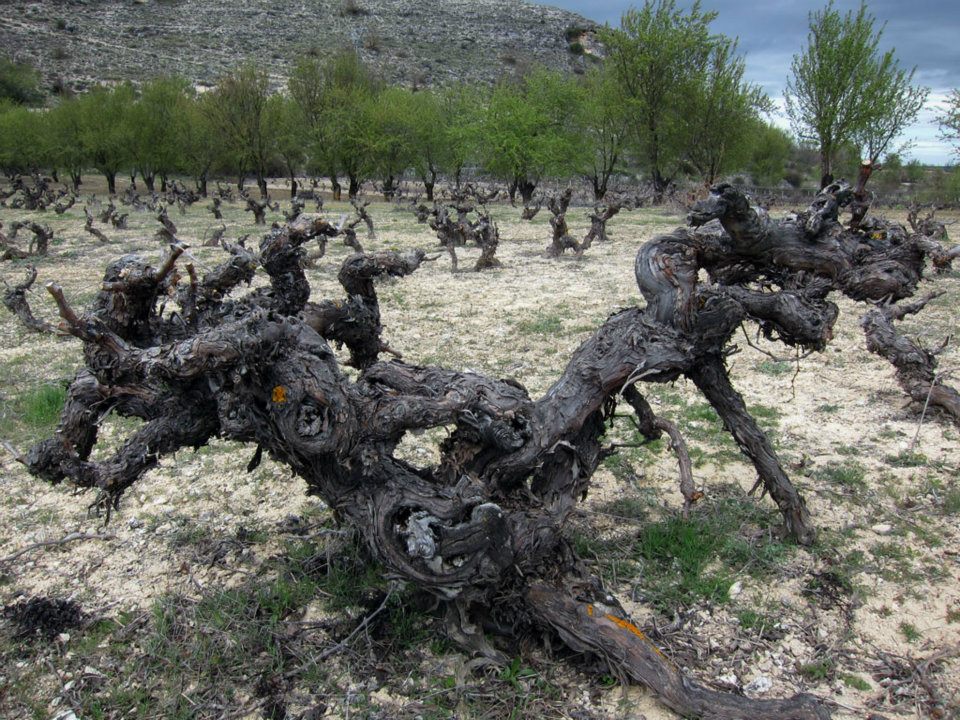 So you started on this process of natural wine, low intervention winemaking in around 2000. How has your winemaking evolved over time? How was your winemaking philosophy evolved over time?
So you started on this process of natural wine, low intervention winemaking in around 2000. How has your winemaking evolved over time? How was your winemaking philosophy evolved over time?
I don't use the term natural wine. I only use the term quality wine. I am looking for quality wines. I look for the best wine for the expression, for the history, for the geography. However when I'm working I learn the soil; I learn what the plant says to you. If you don't intervene in the medium, with the soil, with the weather, with the animals, the balance of the microsystem, the grasses and soil and vineyards, I will know. I know the history of the different areas because I have worked in different areas of Spain. This sensibility about the areas and their differences is to make different wines from different areas of the D.O.s or the lands.
Has your viticulture changed much? The way that you're growing your grapes, has that changed a lot over time?
Yes. Step by step things are changing. Nowadays I have more money, and this money is for use for making more natural viticulture with animals, with horses for example. My vineyards are very old in Spain and the distance between the plants, the different elements around my old vineyards, were created with the old tractor, and the old tractor in the last century was a horse. The distance of the plants, for example, was for the horse. Nowadays the distance between the plants is greater because man needed this distance, the plants don't need this distance. We need this distance for horses, for using machines. However I maintain the same machines, which are the horses, the donkeys.
So how old are all the vines? What kinds of grapes are you working with?
My vineyards, they have an age of 80, because I have 127 in Ribera del Duero where Garnacha is the most planted. The youngest is 20 years or so.
How many different vineyards are you working with at the moment?
My different areas are mainly in Ribera del Duero, Cigales, near Valladolid which is the capital of Castilla y León, and Sierra de Gredos too. Sierra de Gredos is my newest discovery. In 2012 I discovered two mountains in Sierra de Gredos—big, high mountains near Madrid.
Talk about the terroir in the two areas that you make your wines.
In Ribera del Duero we have three styles of soil. In the bottom of the valley, the soil is alluvial. The wines from this soil are in reality more elegant, finer, with more acidity. In the hills the soil is clay. The clay gives wines good aging potential, more structure, more muscle, and the combination with the bottom, alluvial soil and the clay gives a typical wine from Ribera del Duero. And finally, in the top of the valley, the soil usually is limestone, calcareous. Limestone gives wines with high acidity because the top of the valley has 1,000 meters of altitude and the acidity is very generous. The color is high. It is difficult to cultivate but the wines are very interesting to me.
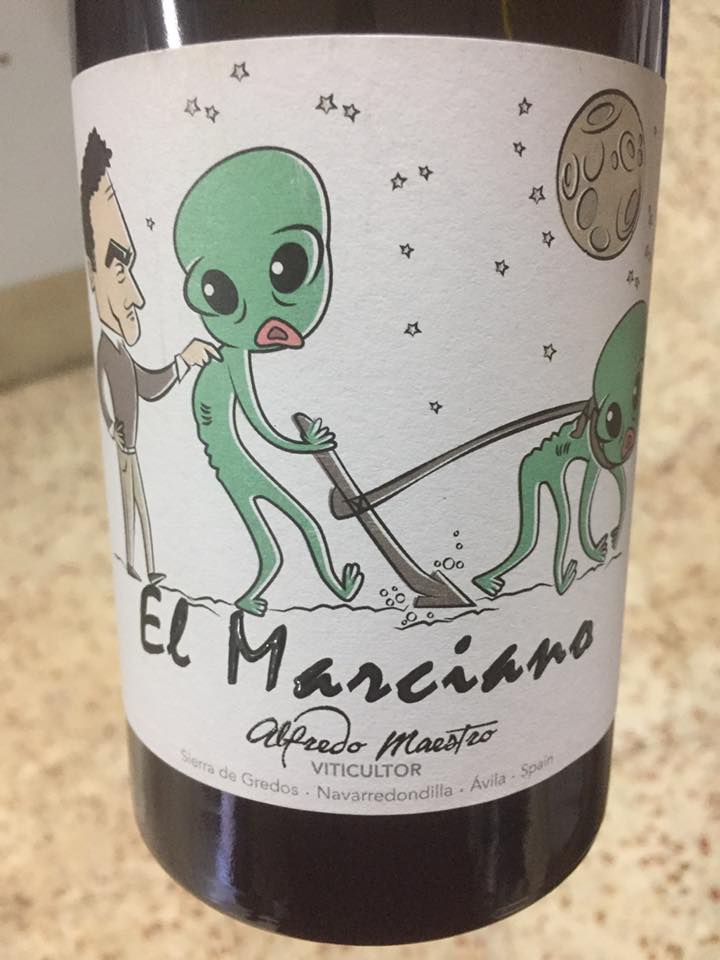 Talk about this wine, The Martian. I mean, it's certainly one of the most creative labels, but the wine itself is fantastic.
Talk about this wine, The Martian. I mean, it's certainly one of the most creative labels, but the wine itself is fantastic.
This label, this wine, is a crazy wine because in a short time it has become known all over the world, thanks to this label. This label is an expression of Sierra de Gredos, in particular where the wine is from, Navarredondilla. Navarredondilla is a village at the top of the mountain with 1,200 meters of altitude, granite soil, and a big rock with plants growing in the middle of the rock. It is a very pretty area. The area is famous because it is a hot spot for viewing UFOs, Martians, and everything else related to this. On this wine label I show how I go very early to work in my vineyard and I discover two Martians working in my vineyard and I say, "Sorry, what are you doing in my vineyard?" This is a little history of the label.
Illegal immigrants, right?
Yes.
In terms of your wine, you don't use sulfur in your winemaking. In some cases that can cause bottle variation. Your wines are very clean. I mean, they are delicious wines whether you call them natural or not. How do you make wines that are so good and consistent without using sulfur?
I don't use sulfur except in my first effort when I just started to make wine, when I didn't know what natural wine was. I learned to make my wines one step at a time. First I used sulfur, then I began making wine without sulfur, without added yeast, unfiltered, without all those ingredients. For me I haven't had a problem with that. Before making wine I was a very good taster; I have very clear expectations of what makes quality wine. I look for quality in wines. Of course after quality, natural wine is better because the viticulture is natural and is free of chemical additives.
But the first question, the first part is the most important. The wine will be high quality. We don't say sorry this wine has defects but it is a natural wine. No. Natural wine will be quality wine the first time. If it is natural all the better and if the viticulture is natural all the better, and for me, I have good luck, and I think a good plan, and I keep the balance in the vineyards.
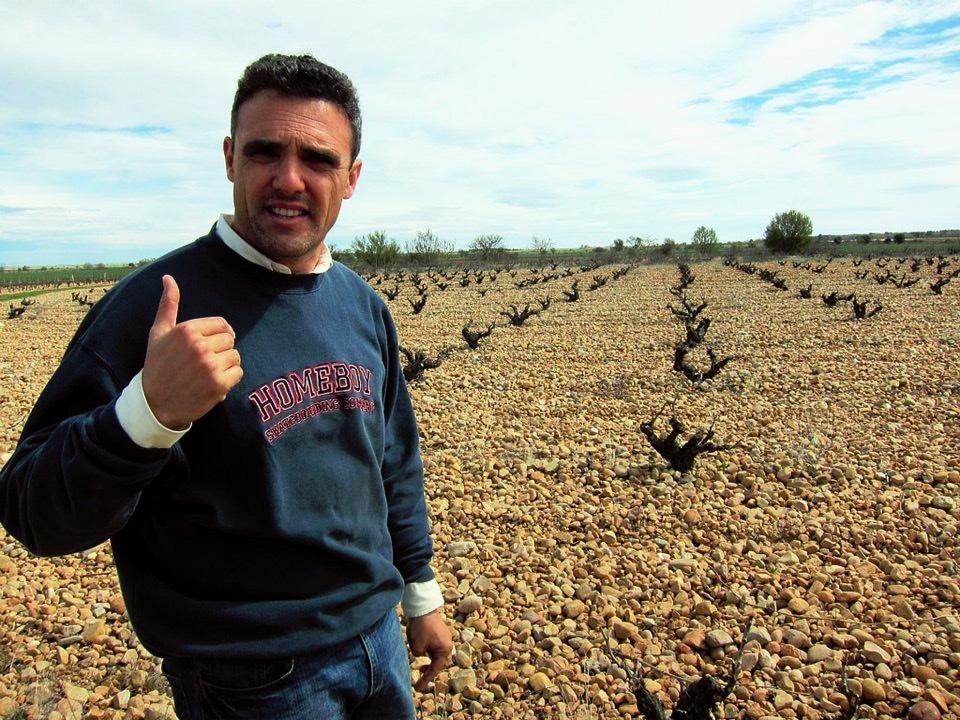 So Alfredo, you have 17 different cuvées at the moment. What makes you go from making say 13 cuvées to 14 cuvées to 15? What is the thinking in terms of adding a different type of wine? Do you find a little part of the vineyard that is unique, or what is it?
So Alfredo, you have 17 different cuvées at the moment. What makes you go from making say 13 cuvées to 14 cuvées to 15? What is the thinking in terms of adding a different type of wine? Do you find a little part of the vineyard that is unique, or what is it?
The vineyard looks for me. I don't look for the vineyard. Because in Spain I am more or less famous because I recuperated the vineyards in my province, Castilla y León. The old owner called me to give me his vineyards. His vineyards have high potential due to history in the roots in and around these vineyards, and I have a sensibility for understanding the owner, understanding the plants, the soils, and for listening to the different needs of the plants.
In a short time I began to make the wine, different cuvées, because I intended to respect the special characteristics of the same village—north face, south face, alluvial, clay, all in the same village. The plant is the same, however the characteristics are different. I intend to respect and really the wine shows a difference. I think this vineyard needs a new wine.
So Alfredo, what plans do you have for the future?
I begin to sell two different cuvées. The first is from Cigales, a Garnacha Gris. It is my discovery because Cigales is mainly famous in Spain for typical Spanish rosé. However the vineyard is very old and I discovered in these vineyards so much Garnacha Gris. These began as a little quantity of grapes and the wine is so, so interesting. And I am making two new wines that are sparkling, natural wine using the ancestral method with Pinot Noir from the south of Spain with a little bit Garnacha Tintorera from Ribera del Duero for color because I like rosé with sparkling. This vintage was my first time, my first experiment. The first three were bad and went into the river Duero, and finally this vintage I saw was good. As I explained for me the most important thing is quality, and the three first times were not good.
Makes normal people feel good that even the superstars have to screw up a couple of times. Effort is a big part of it.
I am making a natural river Duero! However this sparking wine, sparkling rosé wine is so good. Low in alcohol, high acidity, and very fine bubbles. I am very happy with this wine.
Is this a pét-nat? Is second fermentation in the bottle?
Yes, in a bottle. It is made using the ancestral method with the second fermentation because I put Garnacha Tintorera with a little bit of residual sugar for fermentation. No added sugar. Only natural sugar. And this natural sugar makes a second fermentation and it's a natural sparkling wine.
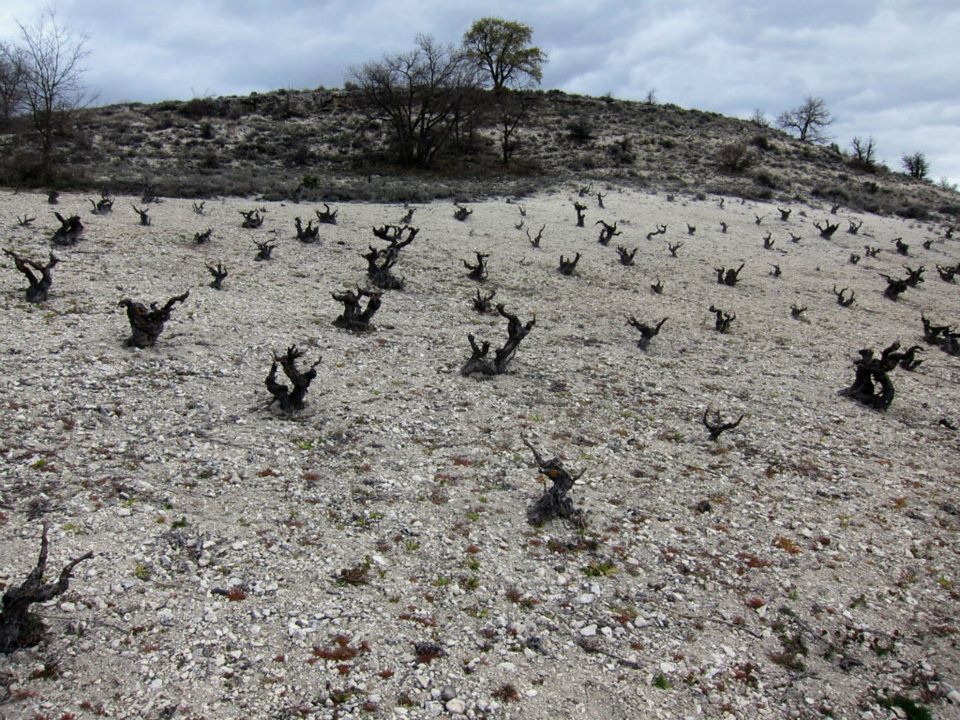 What kind of grapes are you working with right now, mostly?
What kind of grapes are you working with right now, mostly?
Nowadays, mainly Tempranillo from Ribera del Duero, Garnacha, and Garnacha Tintorera. For white grapes mainly Albillo, Moscato. But Moscato is a crazy wine, it's very difficult to make and to conserve but it is a more explosive wine and the best restaurants in Europe have this wine with Moscato and Garnacha Gris.
So Alfredo, are there any winemakers who have influenced your winemaking either through wines that you've tasted or through people that you've personally visited?
I think no because my beginning was free. I don't study, I don't visit. This thing that permitted my evolution was freedom. Nowadays I visit in my travels but my first years the influence over me didn't exist. I discovered all in the vineyard, all in the cellar without any outside influences. I make my own interpretation, for good and for bad. My wine is my imagination with the soil; I am only the manager.
So Alfredo, do you have hobbies outside of the wine world? I mean I imagine this takes up a lot of time but, what do you like to do?
Nowadays, my hobby is CrossFit.
CrossFit?
CrossFit, and working and playing with my horse. But mainly CrossFit.
Your horse is usually very busy tilling the soil, right?
I speak with my horse too.














